LEARN – News Update
April 30, 2015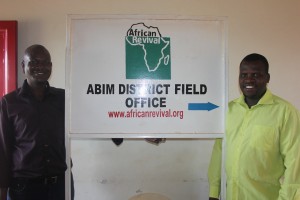 The African Revival livelihoods team spent the most of last week in Agago and Abim – districts within Uganda’s Acholi sub-region – to monitor the progress of our school demonstration gardens programme “LEARN” which launched last year with funding from SNV ( you can learn more about the programme here.
The African Revival livelihoods team spent the most of last week in Agago and Abim – districts within Uganda’s Acholi sub-region – to monitor the progress of our school demonstration gardens programme “LEARN” which launched last year with funding from SNV ( you can learn more about the programme here.
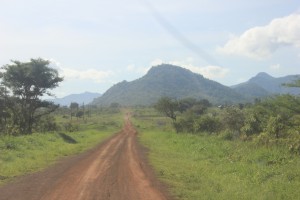
The green and lush districts of Agago and Abim are situated in Uganda’s beautiful north-western mountainous region. In this remote area, the key livelihood strategy is farming and agriculture. However, in recent years, crop yields have been greatly affected by climate change and changing weather patterns, which have disoriented the traditional planting seasons. Consequently, in spite of their beauty, these districts have known great poverty; feeding and clothing families continues to present a daily challenge for many.
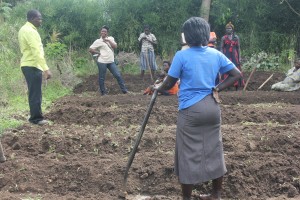 In the Abim district, LEARN’s project support workers – Denis and Godfrey – have been working on the ground to mobilise community gardens in ten local schools, where groups of parents can gain new agricultural skills and training on how to maximise their crop yields, and in turn, their profits. Maize and sweet potatoes are the most popular crops to grow, but the livelihoods team have been introducing new crops to the region – such as aubergines and tomatoes – through providing seeds to the school gardens group, to provide greater nutritious variation within the local community.
In the Abim district, LEARN’s project support workers – Denis and Godfrey – have been working on the ground to mobilise community gardens in ten local schools, where groups of parents can gain new agricultural skills and training on how to maximise their crop yields, and in turn, their profits. Maize and sweet potatoes are the most popular crops to grow, but the livelihoods team have been introducing new crops to the region – such as aubergines and tomatoes – through providing seeds to the school gardens group, to provide greater nutritious variation within the local community.
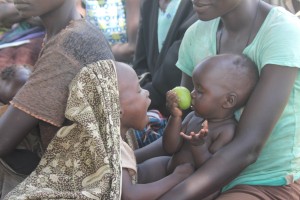 One parent, George working at Akwangagwel Primary School’s garden, said: “I am happy to learn new skills; I have learnt how to plant nursery beds, and learnt that you should plant your seeds in rows to maximise crop yield. Growing more crops means I have more profits so it has lightened my financial concerns. It is a relief for me to be able to pay for my children’s school fees, because their education is very important to me. Also, now I visit their school more often to track the progress of my children”. We are so pleased that the project is positively impacting hard-working households like George’s. Indeed, our ultimate goal is to positively impact children’s education and so, the hope is that with the extra income generated by the garden, parents will no longer struggle to pay children’s school fees, and purchase scholastic materials for their children. Denis told us that he is encouraged with the progress of the programme, particularly “ seeing people replicate what they have learnt at the school gardens into their own gardens at home is so encouraging; people have been increasing their productivity at home which is great.”
One parent, George working at Akwangagwel Primary School’s garden, said: “I am happy to learn new skills; I have learnt how to plant nursery beds, and learnt that you should plant your seeds in rows to maximise crop yield. Growing more crops means I have more profits so it has lightened my financial concerns. It is a relief for me to be able to pay for my children’s school fees, because their education is very important to me. Also, now I visit their school more often to track the progress of my children”. We are so pleased that the project is positively impacting hard-working households like George’s. Indeed, our ultimate goal is to positively impact children’s education and so, the hope is that with the extra income generated by the garden, parents will no longer struggle to pay children’s school fees, and purchase scholastic materials for their children. Denis told us that he is encouraged with the progress of the programme, particularly “ seeing people replicate what they have learnt at the school gardens into their own gardens at home is so encouraging; people have been increasing their productivity at home which is great.”
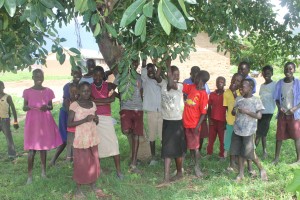 The school gardens project has also mobilised “garden clubs” for primary school children; agricultural work is often by children as a punishment, a perception we are keen to change and instead demonstrate that farming is a profitable activity. Through the garden clubs, our team has sought to enthuse and empower children through learning new agricultural skills, and transforming these into profits which can be used to buy scholastic materials, or school uniforms. The student garden club at Acangali Primary School has had a successful harvest, the onions were particularly plentiful! Sarah, the chairperson of the student garden club told us: “I am learning new skills; and I have shown my new knowledge to my family. I go to work in the garden three times a week, and I have really enjoyed making some money which I can use to help my education”.
The school gardens project has also mobilised “garden clubs” for primary school children; agricultural work is often by children as a punishment, a perception we are keen to change and instead demonstrate that farming is a profitable activity. Through the garden clubs, our team has sought to enthuse and empower children through learning new agricultural skills, and transforming these into profits which can be used to buy scholastic materials, or school uniforms. The student garden club at Acangali Primary School has had a successful harvest, the onions were particularly plentiful! Sarah, the chairperson of the student garden club told us: “I am learning new skills; and I have shown my new knowledge to my family. I go to work in the garden three times a week, and I have really enjoyed making some money which I can use to help my education”.
We hope that this garden continues to perform well, and that the children’s hard work and dedication will pay off with a fruitful harvest later on in the year. As always, you can catch more project updates on the website, and on social media so be sure to follow us on Twitter and Facebook!
